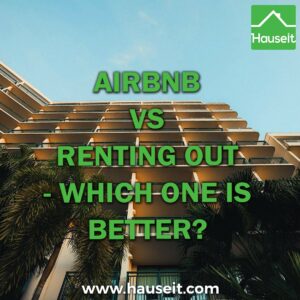If you’re leaning towards a more hands-off approach, traditional renting is the way to go. It’s straightforward, less time-consuming, and offers steady, passive income.
On the flip side, Airbnb can be quite lucrative if you’re up for the hustle. But higher short-term rental rates come with their own set of challenges: potential vacancies, local law changes like NYC’s new short-term rental law, and let’s not forget Airbnb’s hefty fees. The right choice? Well, it depends on how active you want to be!
Pros & Cons of Airbnb vs Traditional Renting
Both methods offer the same tax advantages, with AirBnB offering additional tax incentives in terms of snacks, toiletries and other furnishings that you can regularly write off (just like a hotel). AirBnB offers higher short-term rental rates, but come with vacancy risk and more financial risk if you have a mortgage since your rental income isn’t contractually set for term. Lastly, AirBnB entails much more work (i.e. running a small hotel) vs being a long-term landlord, which is much more passive (or can be!).
With traditional renting, you’re looking at a more predictable income stream (ASSUMING you’ve been diligent with tenant selection). It’s like setting your property on cruise control. And hey, don’t forget the tax advantages! Depreciation, for instance, is a real gem. It helps you offset rental income, easing your tax burden. Pretty neat, right?
Now, let’s chat about Airbnb. It’s a whole different ball game. Sure, you can charge higher short-term rates, but it’s not all sunshine and rainbows. The financial risk is higher. Think about it – short-term rental rates could dip as you’re competing with the hotel market, especially if your market cools down (i.e. think massive new luxury rental supply in Miami). And if you’ve got a mortgage hanging over your head, that’s a risk you can’t ignore since your rental income isn’t contractually locked-in for term.
But wait, there’s a silver lining with Airbnb. Furnishings, snacks for guests, even the cute little soaps in the bathroom – these expenses can be deducted. It’s all about those frequent replenishments, which aren’t usually part of traditional long-term rentals.
Furnished apartment? You can deduct the initial setup in both scenarios, but Airbnb lets you keep deducting as you restock and refurbish. That’s a financial edge worth considering.

So, what’s the bottom line? Airbnb offers the potential for higher income but comes with more financial unpredictability and hands-on management. Traditional renting is your go-to for stability and a more laid-back role as a landlord. The choice hinges on your financial comfort zone and how hands-on you want to be in this real estate adventure.
Save 2% On Your Home Purchase
Save thousands on your home purchase with a buyer agent commission rebate from Hauseit
Airbnb vs Renting Out in NYC
NYC’s Local Law 18, enforced from September 5, 2023, significantly tightens the rules for short-term rentals. It requires hosts to be physically present, limits guests to two, and mandates unlocked doors within the unit, creating a shared space.
These rules, along with the stringent registration process including displaying emergency exit routes and a rental certificate, essentially make traditional Airbnb-style rentals impractical, if not impossible. Non-compliance can lead to steep penalties. This law effectively reshapes the short-term rental market in NYC, pushing hosts towards more traditional, long-term rental strategies.
An overview of Local Law 18 in NYC
Trying to be an AirBnB host in NYC has been challenging, especially with New York City’s Local Law 18, effective since January 9, 2022, which has reshaped the short-term rental landscape.
Local Law 18 requires short-term rental hosts to register with the Mayor’s Office of Special Enforcement (OSE). This law targets rentals that are less than 30 days long. If you’re eyeing Airbnb, remember that unregistered listings are a no-go for booking platforms like Airbnb, VRBO, etc. Starting from September 5, 2023, the OSE is laser-focused on ensuring that all short-term rental transactions are verified and legal.
Now, let’s talk specifics. The law is clear: you can’t rent out an entire apartment or home for less than 30 days unless you’re also staying there. This applies to all permanent residential buildings, irrespective of the number of units.
Think of it as a way to maintain a common household with your guests. More than two paying guests? That’s crossing the line into illegal territory.
But wait, there’s more. OSE maintains a Prohibited Buildings list, which includes buildings where short-term rentals are outright banned. This could be due to various reasons like NYCHA rules or specific leases and occupancy agreements. So, before you jump into Airbnb hosting, make sure your building isn’t on that list.
For those considering entire unit rentals in one and two-family homes, the law is strict: these are meant for long-term residence purposes only.
The key takeaway? In NYC, the Airbnb route is laden with legal nuances. You need to be well-versed with Local Law 18, stay on top of your building’s status, and adhere strictly to the occupancy rules. Traditional renting, on the other hand, offers a more straightforward path, free from the intricate web of short-term rental regulations.
For anyone in the real estate business considering listing properties for short-term rentals, it’s crucial to be in the loop about these regulations. Avoiding compliance could lead to hefty fines and legal headaches. Always ensure the property is correctly registered and align with the latest guidelines to steer clear of any potential violations.
For more detailed information on NYC’s short-term rental laws, you can visit the NYC Office of Special Enforcement’s Registration Law page and Registration Rules and Laws page.
Airbnb vs Renting Out in South Florida
South Florida is a popular investment choice for short-term rentals, due to the popularity of the region for snowbirds and vacationers and its more investor friendly laws. As a result, whether you wish to AirBnB or rent out your property depends on how involved you want to be as a landlord, and how much risk you want to take on. As we discussed in the introduction, AirBnB can bring in higher profits due to higher short-term rental rates, but involves more work and risk.
Remember that it’s much easier to build in Florida due to the lack of stringent zoning laws like in NYC or California, nor many historical districts that can’t be touched. As a result, if developers can buy up the lots and the cost to build (and resell) makes sense, they’ll keep building until the market becomes oversaturated and crashes.
All of this means that South Florida has historically been a boom and bust real estate market, so watch out for a new condo building going up next door which suddenly doubles the rental supply overnight.
Condo rules vary widely in South Florida, from minimum lease periods of 6 months – a common choice for snowbirds flocking down from the Northeast – to more flexible options allowing 1-month leases. And yes, there are buildings that are completely open to short-term rentals.
This flexibility caters to a wide range of needs, from those seeking a winter retreat to others desiring a quick beachside getaway.
However, it’s not just about choosing the right building. Florida law adds another layer to consider for short-term rentals. If you’re planning to rent out your property more than three times a year for stays shorter than 30 days each, you’ll need to secure a vacation rental license from the Florida Department of Business and Professional Regulation (DBPR). You don’t need any such licensure if you are renting out your property longer term.
The Florida short-term rentals law requires property owners to adhere to specific regulations, including obtaining a business license if renting out more than three times annually for less than 30 days each. Short-term rentals are classified as condos or dwelling units, with different applications for each. No opening inspections are required, except for a balcony inspection certificate every three years for Airbnb properties.
Local ordinances vary by county, and it’s essential for owners to stay informed and compliant. Many Florida counties and cities have their own set of rules for vacation rentals, covering everything from minimum stay durations to noise constraints and parking logistics.
Moreover, Florida’s new laws in 2023 have given local governments enhanced powers to regulate short-term rentals. For instance, they can now suspend vacation rental registrations for up to 30 days following multiple violations of local ordinances.
Airbnb vs Renting Out in TX & CA
Choosing between Airbnb and traditional renting in states like CA or TX hinges on local short-term rental laws and the state’s tenant-friendliness. In tenant-friendly states, short-term rentals carry the risk of tenants overstaying their booked duration, leading to prolonged eviction processes. Balancing local rental regulations with the state’s tenant-landlord dynamics is key in making an informed decision.
AirBnB vs Renting Out in Texas
In Texas, the approach to Airbnb and short-term rental regulations varies significantly by city. Statewide, there’s no specific permit required for short-term rentals (STRs), but businesses renting tangible property must obtain a Texas sales tax permit. The regulations are predominantly set by individual municipalities, with some cities like Arlington implementing basic regulations such as maximum occupancy limits, parking restrictions, noise restrictions, and a 30-day maximum occupancy limit. Austin, however, has stricter rules, particularly for “Type 2” short-term rentals which are not owner-occupied, though recent legal developments suggest a shift towards more permissive regulations. Dallas and Frisco also have their own sets of regulations, with Dallas debating new zoning regulations and Frisco requiring permits for STR hosts. For tax implications, Texas STRs are subject to the Hotel Occupancy Tax (HOT), which applies both at the state and local levels.
In summary, if you’re considering Airbnb or traditional renting in Texas, it’s crucial to research the specific regulations and tax implications in the city where your property is located. Each city has its unique set of rules, and staying informed will help you navigate the rental landscape successfully.
AirBnB vs renting out in California
In California, the approach to Airbnb and short-term rental (STR) regulations largely depends on local city ordinances, although there are some state-level requirements and tax implications to consider.
Statewide, there’s no uniform lodging tax, but cities and counties can levy a transient occupancy tax (TOT) on accommodations rented out for 30 days or less. This means that if you’re operating a short-term rental, you might need to register with local tax authorities, collect TOT from guests, and file TOT returns. The exact requirements vary by city or county.
In Los Angeles, under the Home Sharing Ordinance, you’ll need to register your home for a Home Sharing Registration (HSR) number. This registration is necessary to list your property on short-term rental sites like Airbnb. The property should be your primary residence, and there are specific requirements to ensure the property is approved for short-term rental use. Los Angeles also enforces rules around the total number of days per year a property can be rented out and has a strong focus on maintaining neighborhood peace and order.
San Francisco requires STR operators to register their business with the city. Additionally, short-term rental properties must adhere to safety and maintenance standards set by the city.
San Diego has recently implemented new STR regulations, including a cap on the number of licenses and a lottery system in certain areas. Hosts in San Diego are required to collect TOT from guests unless it’s collected on their behalf by a rental platform.
Each major city in California has specific rules and regulations governing STRs, with a common focus on registration, taxation, safety, and neighborhood wellbeing. It’s essential to become well-versed in your city’s regulations to ensure compliance.
Save 2% On Your Home Purchase
Save thousands on your home purchase with a buyer agent commission rebate from Hauseit
Should you AirBnB or Rent Out Your Property?
The decision between Airbnb and traditional renting is not just about laws and potential earnings; it’s deeply personal and aligns closely with your goals and lifestyle preferences. Do you envision being an active participant in the management of your property, or are you seeking a more passive role?
Active Involvement: Airbnb Hosting
-
Hands-On Management: Airbnb requires active involvement. You’re not just a landlord; you’re a host. This means regular communication with guests, managing bookings, and ensuring a top-notch guest experience.
-
Property Upkeep: Frequent turnovers imply more maintenance. You’ll need to keep the property in excellent condition, which means regular cleaning, restocking supplies, and prompt repairs.
-
Higher Earning Potential, Higher Risk: While Airbnb can offer higher short-term returns, it comes with the risks of fluctuating demand, greater time investment, and potential legal changes.
-
Community Building: Hosting on Airbnb can be rewarding beyond finances. It offers the chance to meet diverse people and create a unique experience for your guests.
Passive Income: Traditional Renting
-
Steady, Predictable Income: Traditional renting provides a more predictable and steady income stream. It’s ideal if you prefer stability over the highs and lows of short-term rental income.
-
Less Time-Intensive: Once you have a tenant, the day-to-day involvement is significantly reduced. Property management can even be outsourced, making it a truly passive income source.
-
Long-Term Tenants, Less Hassle: With long-term rentals, you’re not constantly looking for new tenants. This means fewer worries about occupancy rates and less frequent maintenance issues.
-
Tenant Laws and Stability: In tenant-friendly states, the long-term rental approach offers more stability and less risk of complicated eviction processes.
Ultimately, your choice between Airbnb and traditional renting should reflect your personal goals and how involved you want to be. If you’re enthusiastic about actively managing a property and navigating the dynamic short-term rental market, Airbnb could be a fulfilling venture.
On the other hand, if you prefer a more hands-off approach with consistent returns, traditional renting is a solid choice. Consider your lifestyle, risk tolerance, and investment goals to make the decision that best suits your needs.
Speculating on policy changes in weak markets like SF
As we turn our gaze to the future, particularly in fluctuating real estate markets like San Francisco, there’s room for speculation and strategic thinking. Currently, we’re observing a somewhat weak real estate market in SF, characterized by lower prices and an exodus of people and businesses. This situation poses a unique question: what if this trend prompts the local government to adopt more landlord and business-friendly policies?
Potential Shifts in Local Policies
-
Reaction to Exodus: With the ongoing movement of people and businesses out of San Francisco, there could be pressure on the local government to make the city more appealing to landlords and investors.
-
More Favorable Regulations: In response, we might see a relaxation of stringent rental regulations, creating a more conducive environment for property investments.
-
Attracting Businesses Back: To revitalize the local economy, there may be initiatives aimed at bringing businesses back to the city, which could, in turn, increase the demand for both residential and commercial properties.
Upside for Real Estate Investors
-
Market Opportunities: If the city becomes more landlord-friendly, it could lead to a significant upside in the real estate market. Lower property prices now might spell great investment opportunities for the future.
-
Rental Market Revival: A shift in policies could rejuvenate the rental market, making both traditional renting and Airbnb more profitable.
Long-Term Growth: Changes in local governance, coupled with economic incentives, could stimulate long-term growth and stability in the real estate market.
Considerations for Investors
-
Stay Informed: Keep an eye on policy changes and market trends in San Francisco and similar cities. Being ahead of the curve can offer significant advantages.
-
Risk Assessment: Consider the potential risks and rewards. While there’s upside potential, it’s crucial to balance it with the realities of the current market.
-
Diversification: In uncertain times, diversifying your investment portfolio can help mitigate risks. This might mean investing in different types of properties or spreading investments across various markets.





